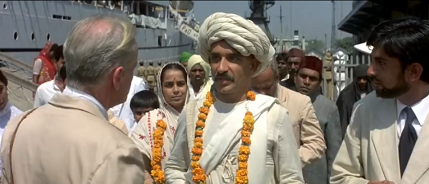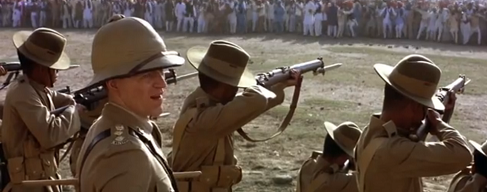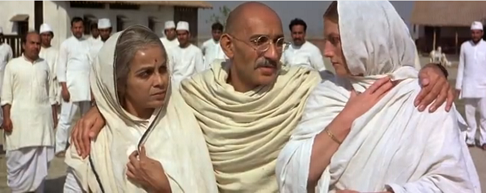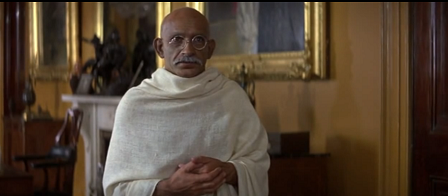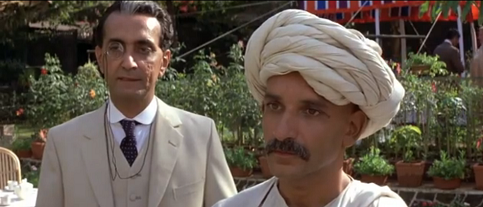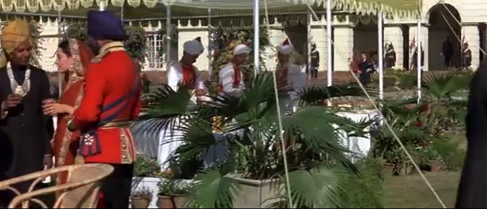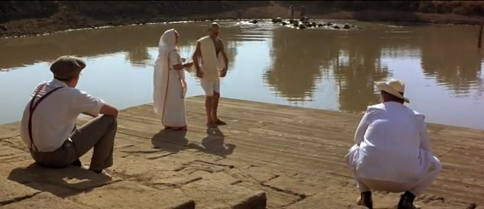Gandhi, the film (1982)
This is a collection of articles archived for the excellence of their content. |
Contents |
Who played…?
(In lieu of the usual cast credits)
A.D.C. John Vine ...
Abha Neena Gupta ...
Advocate General John Clements ...
Andrews, Charles F.: Ian Charleson
Apte Vijay Kashyap ...
Bourke-White, Margaret: Candice Bergen
Brigadier: Richard Leech ...
Broomfield, Judge: Trevor Howard
Colin Daniel Day-Lewis ...
Collins Richard Griffiths ...
Daniels David Gant ...
Desai, Mahadev Pankaj Mohan ...
Dyer, General: Edward Fox
Edgar, General Bernard Horsfall ...
G.O.C. :Bernard Hepton ...
Gait, Sir Edward : Richard Vernon ...
Gandhi, Kasturba: Rohini Hattangadi ...
Gandhi, Mahatma Ben Kingsley
Gandhi, Manilal Avpar Jhita ...
Gandhi, Ramdas: Anthony Sagger ...
Godse, Nathuram: Harsh Nayyar ...
Gokhale, Professor: Shreeram Lagoo ...
Harilal, Gandhi Raj Chaturvedi ...
Hodge, Sir George: Michael Hordern ...
Hunter, Lord: Ernest Clark ...
Irwin, Lord: John Gielgud
Jallianwalla Bagh speaker: Gurcharan Singh ...
Jinnah, Mohammed Ali: Alyque Padamsee ...
Kallenbach, Herman Günther Maria Halmer
Karkare Nigam Prakash ...
Khan, Abdul Ghaffar: Dilsher Singh ...
Khan: Amrish Puri ...
Kinnoch Nigel Hawthorne ...
Kripalani, J.B.: Anang Desai Anang Desai ...
MacDonald, Ramsay Terrence Hardiman ...
Manu Supriya Pathak ...
Maulana Azad Virendra Razdan ...
Mirabehn: Geraldine James ...
Mountbatten, Lady: Jane Myerson Jane Myerson ...
Mountbatten, Lord: Peter Harlowe ...
Nahari: Om Puri ...
Naidu, Sarojini: Tarla Mehta ...
Nayyar, Sushila: Irpinder Puri ...
Nehru, Motilal: Sudarshan Sethi Sudarshan Sethi ...
Nehru, Mrs. Motilal: Sunila Pradhan ...
Nehru, Pandit JL: Roshan Seth ...
Patel, Sardar: Saeed Jaffrey
Police Commissioner Sudhir Dalvi ...
Prakash Prabhakar Patankar ...
Principal Secretary Michael Bryant ...
Putnam, Sergeant: Bernard Hill Bernard Hill ...
Pyarelal: Pankaj Kapur ...
Schlesin, Sonja: Caroline Hutchison ...
Shukla Manohar Pitale ...
Smuts, General: Athol Fugard
Suhrawardy Shekhar Chatterjee ...
Tahib: Tilak Raj ...
Tyeb Mohammed Alok Nath ...
Viceroy: John Mills ...
Walker Martin Sheen
Zia: Dalip Tahil ...
Director
Richard Attenborough
Writer (Screenplay)
John Briley ...
Producers
Richard Attenborough ... producer
Rani Dubé ... co-producer
Suresh Jindal ... associate producer
Music
Ravi Shankar
Cinematography
Ronnie Taylor ...
Billy Williams ...
Editing
John Bloom
Costume Design
Bhanu Athaiya
John Mollo
Gandhi, the film
Richard Attenborough's 'Gandhi': Lesser known facts about the film
Directed and produced by Richard Attenborough, 'Gandhi' was released in India on November 30, 1982. The film released a few days later on December 3 in the United Kingdom and three days later on December 6 in the United States of America. The film had a grand premiere in the UK on December 2, 1982 at the Royal Premiere at the Odeon Leicester Square in London. The film's premiere was attended by Prince Charles and his then wife Princess Diana. Apparently, 'Gandhi' had a limited release in the US initially but that was later followed by a wider release in January 1983.
'Gandhi' was nominated for Academy Awards in eleven categories out of which it won eight awards. Richard Attenborough won the Oscar for Best Director. The film also won the Best Picture, Best Original Screenplay, Best Film Editing, Best Art Direction, Best Cinematography, Best Costume Design that went to Bhanu Athaiya and the Best Actor Award that went to Ben Kingsley who played Mahatma Gandhi in the film.
'Gandhi' was Richard Attenborough's dream project and he waited for several years to finally complete it. According to news reports two previous attempts at filming 'Gandhi' had already failed. In 1952, Gabriel Pascal, a Hungarian film producer and director had secured an agreement with the Prime Minister of India at that time, Pandit Jawaharlal Nehru to produce a film on Mahatma Gandhi's life. However, Pascal passed away in 1954 and the film could not be made.
Apparently Richard Attenborough took almost 18 years to make a film on 'Gandhi'. Efforts paid eventually when the film won both critical acclaim and commercial success. Apparently the story goes like this. In 1962 Attenborough received a phone call from Motilai Kothari, an Indian-born civil servant working with the Indian High Commission in London and a devout follower of Gandhi. Kothari insisted that Attenborough meet him to discuss a film about Gandhi. Attenborough read Louis Fischer's biography of Mohandas Karamchand Gandhi and agreed. Attenborough met then Prime Minister of India, Jawaharlal Nehru and his daughter Indira Gandhi through a connection with Lord Louis Mountbatten, the last Viceroy of India. Nehru had apparently approved of the film and promised to help support its production, but his death in 1964 was one of the film's many setbacks. Finally when the film was made, Attenborough dedicated it to the memory of Kothari, Mountbatten and Nehru.
The director of the critically acclaimed film 'The Bridge on the River Kwai', David Lean had also planned to make a film on the life of Mahatma Gandhi. He had planned to start making the film after finishing 'The Bridge on the River Kwai' reportedly with Alec Guinness as Gandhi. However, it is rumoured that the project was abandoned and the makers decided to make 'Lawrence of Arabia' instead. What is interesting here is Attenborough had even approached David Lean with his own Gandhi project in the late 1960s that Lean had agreed to direct offering Attenborough the lead role in the film. However, David Lean got busy with another project during which Motilai Kothari passed away and the project in the end fell apart.
That wasn't the last time that Attenborough faced trouble completing his dream film. Attenborough again attempted to resurrect the project in 1976 with backing from Warner Brothers. However, then Prime Minister Indira Gandhi declared a state of emergency in India that made shooting impossible for the project. Finally in 1980 Attenborough was able to secure both the funding and locations needed to make the film. Co-producer of the film Rani Dube persuaded Indira Gandhi to provide $10 million from the National Film Development Corporation of India as the film was falling short on the budget.
Finally shooting for the film began and it took approximately six months to finish shooting. The film made into the Guinness Book of World Records as over 3 lakh extras were used in the funeral scene alone! The casting of the film also created a buzz, as who would play the role of Mahatma Gandhi made headlines. Putting all the speculations a rest, actor Ben Kingsley was chosen to play the part of Mohandas Karamchand Gandhi. It is interesting to note that Ben Kingsley is partly of Indian heritage as his father was Gujarati and his birth name was Krishna Pandit Bhanji.
Petty objections from India's Filmistan
When Prime Minister Indira Gandhi devided to give $10 million (roughly Rs20 crore) from the National Film Development to the makers of Gandhi, there was a huge uproar against the decision within India. The objections came not from illiterate people or the much-reviled political class or even from Bollywood's Bimbo commercial film producers. It came mainly from India's 'intellectual' filmmakers.
They argued that with Rs20 crore around 30 to 40 Indian art films could be made, which was what the NFDC was there for--and not to finance the fat cats of Hollywood and the UK. So loud, intense, vicious and long drawn was this campaign that a person of lesser relove than Mrs Gandhi (several aspects of whose reign, especially the Emergency, Indpaedia is no fan of) would have caved in.
In the event not only did the Rs20 crore loaned to Gandhi get repaid within a year or so, he film made enormous profits for the NFDC---which films made by some of the Indian directors who opposed Gandhi rarely did. For almost a decade the only money the NFDC earned were annual royalties from Gandhi.
Those petty Indian filmakers hever apologised for theoir vicious opposition.
Their second argument was, Why should a foreigner make Gandhi, why not an Indian?
The answer is simple, who prevented an Indian from making such a film?
Then Indian actors objected to Ben Kingsley playing the Mahatma. True, Naseeruddin Shah would have made a great Mohandas Karamchand, but would he have been accepted internationally.
It is the same argument about the film Mary Kom. Many in Manipur objected to a Punjaban playing what Manipur considersd their heroine, but all of India hails as a national heroine. Indpaedia is blatantly pro-Manipur, pro-Manipuri actresses (esp Bala Hijam, Lin Laishram , Tonthoi Leisangthem , Sushmita Devi Mangsatabam... Compare our lovingly crafted pages about these Manipuri talents with our perfunctory page on Priyanka Chopra . But the point remains, who serves the cause of popularising Manipur better: a nationally-known star like Priyanka Chopra, or a Manipuri actress?
In the event, Gandhi was a flop in India, despite all the enormous pre-release publicity, In 1982 (indeed, till the 2013 of Bhaag Milkha Bhaag and Paan Singh Tomar) Indians were not into biopics (exception: a song and dance laden film like Shaheed. ) That is why no Indian filmmaker had bothered to do a film about good old MK. (The micro-budget English language almost theatre-on-celluloid At five past five (1969/ dir: K. Vasudev ) only looked at the plot to assassinate the Mahatma.)
The film Gandhi was rescued only by its huge commercial and critical success outside India. No Indian director or actor could have achieved this.
Shyam Benegal (director) and Naseeruddin Shah (actor) were India's best candidates at the time. Together they made The making of the Mahatma (1996). An outstanding film by Indian standards, mainly because of Fatima Meer's excellent script based on insider knowledge. However, it had a very limited canvas and hardly anyone in India or South Afrfica has heard of it, leave alone in other countrkes.
The Rs20 crore loan popularised the message of the Mahatma all over the world (and its DVDs continue to do so), brought India glory, was promptly repaid and its profits financed much more than the 30 or 40 Indian art films that the principle would have.
Making 'Gandhi' an ordeal for Attenborough
Making 'Gandhi' was a harrowing ordeal for Attenborough
Avijit Ghosh,TNN | Aug 25, 2014 The Times of India
Actor-director Sir Richard Attenborough’s Gandhi (1982) grabbed eight Oscars and India basked in reflected glory.
NEW DELHI: Actor-director Sir Richard Attenborough's "Gandhi" (1982) grabbed eight Oscars and India basked in reflected glory. But making the masterpiece was an ordeal for the British filmmaker.
He had to face a plea in Bombay high court seeking an injunction, endure allegations of racial bias raised in Rajya Sabha. That's not all. More than 20 well-known Indian filmmakers, including Kumar Shahani, Muzaffar Ali, Basu Chatterjee, MS Sathyu, Girish Karnad and Saeed Mirza, wrote to the then I&B minister criticizing the government decision to finance the film.
A New York Times article on Jan 25, 1981 titled, Filming Gandhi's Life Stirs Passion in India, illustrates the point. "Some still-living associates of 'Gandhi' have registered shock that a feature film on his life should be attempted at all, painting it as a premature if not sacrilegious undertaking," it says. The protestors stopped at nothing. Angry letter writers to the Left-wing newspaper Patriot (now defunct) said Britain and the US 'have hatched a conspiracy to rob us of our culture and heritage and trade it for profit, as they once did with our tiger skins, elephant tusks, antiques and temple idols," the NYT piece said.
The filmmakers' objections were more nuanced. In their note, penned under the banner Forum for Better Cinema, they wrote, "We believe the Indian government's financial participation in this venture is unjustified when institutional finance of this kind isn't available to Indian filmmakers. We demand that this amount be used for the advancement of good Indian cinema and for the provision of such facilities as theatres and technical infrastructure."
The letter, partly published in TOI on August 9, 1980, said, "We'd like to make it clear that we don't question Sir Richard's right to make this film with his own finance, nor we doubt his sincerity in wanting to make a film on this subject." The NYT article says nearly $7 million was provided in loan guarantees by the government.
In April 1981, Bombay HC rejected a plea seeking an ad interim injunction restraining "completing, producing, distributing or exhibiting" Gandhi. The plea was made by Morarji Desai and six other trustees of Navjivan Trust founded by Mahatma Gandhi in 1929, TOI reported on April 17, 1981.
Four days later, in an article headlined, 'Eject Sir Richard for racial bias, say elders,' the newspaper said in the Upper House "MC Bhandare of Congres(I) read out press reports that abuses were hurled at Indians (involved in the project) and there was disparity in wages and allowances between them and foreigners."
Nonetheless, the Congres government stayed firmly behind the project which Attenborough obsessed with for nearly two decades. That's because it was approved by Jawaharlal Nehru before he died in 1964.
The NYT article quotes the British filmmaker say that the first Indian PM sent him to members of his cabinet and introduced him to authorities on Gandhi. "I spent quite a bit of time with him, and he gave me valuable advice. I suppose Nehru was closer to Gandhi than anyone else. He willingly said, 'Look, he had all the frailties, all the shortcomings. Give us that. That's the measure, the greatness of a man.' On one occasion in 1963 or '64, I don't remember which, I'd gone to say goodbye to Nehru. I didn't know it'd be the last time I'd see him. As I was leaving — looking for a taxi, I think — Nehru came down the stairs and said: 'Richard, one last thing. In your film, don't deify him. He was too great a man to be turned into a god.'"
It's another matter that the movie stays away from the more controversial aspects of Gandhi's life.
